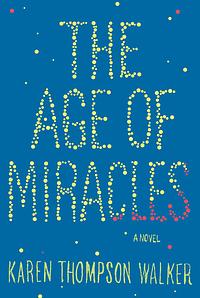Take a photo of a barcode or cover
4.5 stars, actually.
This book is a slow burn. Even though its about Catastrophes (both global and personal) and the surviving of them, don't look for any last minute heroics or scientific breakthroughs-- this is all about the ways we survive on a day to day basis, slowly adjusting to the terrible things around us.
Julia lives in Southern California, so she's no stranger to the ways the Earth can shake things up. But even Julia and her family aren't ready for the gradual slowing of the rotation of the Earth, and the lengthening days and nights, off-balance magnetic fields, and dying birds.
The world's governments deal with this catastrophe piecemeal, reacting with "clock time" when the days lengthen too far, giving up on the astronauts trapped in the space station, and turning off all nonessential power so that dwindling energy can be used for UV lamps to grow food.
Meanwhile, Julia is dealing with personal catastrophes of her own in the same, slow-reacting way. She's lost her best friend to Mormon retreat, her grandfather's disappeared, and her parents are falling away from each other. And there's this boy, Seth, she keeps blurting out awkward things to.
For me, the slow death of society as we know it was tied up with the emotional and social awkwardness of Julila's personality. All the catastrophes play out in a slow, sad, downward spiral. It's the small details of Julia's mother buying emergency peanut butter, and 'real timers' abandoning society for supposed Utopias in the desert, and the social perils of waiting for the school bus in the dark that layer together a delicious, slice-of-near future-dystopia life for the reader to enjoy.
It doesn't quite make the 5th star for me because the pace slowed down just a bit too much for me sometimes, and I felt like the promise of several characters (and their ultimate fates) were never quite fully fulfilled or explained.
Still, my 6th grader said she enjoyed the book as well. (Romancey bits are quite tame). For a literary-flavored near future meditation on weathering emotional and global catastrophes, this is your book.
This book is a slow burn. Even though its about Catastrophes (both global and personal) and the surviving of them, don't look for any last minute heroics or scientific breakthroughs-- this is all about the ways we survive on a day to day basis, slowly adjusting to the terrible things around us.
Julia lives in Southern California, so she's no stranger to the ways the Earth can shake things up. But even Julia and her family aren't ready for the gradual slowing of the rotation of the Earth, and the lengthening days and nights, off-balance magnetic fields, and dying birds.
The world's governments deal with this catastrophe piecemeal, reacting with "clock time" when the days lengthen too far, giving up on the astronauts trapped in the space station, and turning off all nonessential power so that dwindling energy can be used for UV lamps to grow food.
Meanwhile, Julia is dealing with personal catastrophes of her own in the same, slow-reacting way. She's lost her best friend to Mormon retreat, her grandfather's disappeared, and her parents are falling away from each other. And there's this boy, Seth, she keeps blurting out awkward things to.
For me, the slow death of society as we know it was tied up with the emotional and social awkwardness of Julila's personality. All the catastrophes play out in a slow, sad, downward spiral. It's the small details of Julia's mother buying emergency peanut butter, and 'real timers' abandoning society for supposed Utopias in the desert, and the social perils of waiting for the school bus in the dark that layer together a delicious, slice-of-near future-dystopia life for the reader to enjoy.
It doesn't quite make the 5th star for me because the pace slowed down just a bit too much for me sometimes, and I felt like the promise of several characters (and their ultimate fates) were never quite fully fulfilled or explained.
Still, my 6th grader said she enjoyed the book as well. (Romancey bits are quite tame). For a literary-flavored near future meditation on weathering emotional and global catastrophes, this is your book.
emotional
mysterious
medium-paced
Just finished The Age of Miracles, a great book that
I would rename however to The Age of Miseries or The Age of the Unknowns or a much darker title. There were not any miracles, rather very strange inexplicable phenomena on this apocalyptic short novel. Julia is the 11-year-old California girl, our storyteller and using flashbacks as she tells us about the slowing of the earth and days stretching longer and longer, and nights growing darker and colder. Alongside the apocalypse unfolding, you have your typical shy and lonely 11-year-old, wishing for friends who care for her, and a certain boy who might look her way. Very well-done! The book is so easy to read, sign of a great writer, with very few characters and one major theme, the slowing. It's a great depiction of how things may unfold if such a crazy notion were ever to pass. What I loved most about this book are the subtle reflections and observations of how disasters change and affect human beings and their governments and way of life and how the most feared events are least likely to happen and how the worst that could happen is beyond our wildest imagination.
This may sound cliche but it's true: this book gives you a deeper appreciation for all that makes sense in our world: the passing of time and the regular rhythms of night and day, the abundance of plants and animals and food and clean air, music and laughter and friendships and love, and most of all, even if we cannot - could not - predict the future, the calming prospect of being able to hope for one.
I would rename however to The Age of Miseries or The Age of the Unknowns or a much darker title. There were not any miracles, rather very strange inexplicable phenomena on this apocalyptic short novel. Julia is the 11-year-old California girl, our storyteller and using flashbacks as she tells us about the slowing of the earth and days stretching longer and longer, and nights growing darker and colder. Alongside the apocalypse unfolding, you have your typical shy and lonely 11-year-old, wishing for friends who care for her, and a certain boy who might look her way. Very well-done! The book is so easy to read, sign of a great writer, with very few characters and one major theme, the slowing. It's a great depiction of how things may unfold if such a crazy notion were ever to pass. What I loved most about this book are the subtle reflections and observations of how disasters change and affect human beings and their governments and way of life and how the most feared events are least likely to happen and how the worst that could happen is beyond our wildest imagination.
This may sound cliche but it's true: this book gives you a deeper appreciation for all that makes sense in our world: the passing of time and the regular rhythms of night and day, the abundance of plants and animals and food and clean air, music and laughter and friendships and love, and most of all, even if we cannot - could not - predict the future, the calming prospect of being able to hope for one.
While I liked this book showed how things slowly worsened, I felt the end was rushed and I would have liked to have heard more of what happened to Julia between when Seth left and the time she was 23. To me the book ended rather abruptly.
he Age of Miracles by Karen Thomson Walker was a book that scared me a little to read. It is about the slowing of the earth which makes days and nights longer with no scientific explanation. Birds die, whales beach themselves by the thousands and yet for 11 year old Julia, life as a burgeoning teenager continues on in all it's painful reality.
Friends disappear as their families flee the cities, some people choose not to join the mandated clock time and become outsiders. Julia loses her best friend, watches as her parents marriage unravels and her mother suffers from the "syndrome" and tracks her crush, Seth Moreno, from afar.
The book is well written and while anxiety-provoking, it is also thought-provoking and touching as a story about ordinary life in in-ordinary times.
Friends disappear as their families flee the cities, some people choose not to join the mandated clock time and become outsiders. Julia loses her best friend, watches as her parents marriage unravels and her mother suffers from the "syndrome" and tracks her crush, Seth Moreno, from afar.
The book is well written and while anxiety-provoking, it is also thought-provoking and touching as a story about ordinary life in in-ordinary times.
emotional
reflective
sad
tense
slow-paced
Plot or Character Driven:
A mix
Strong character development:
No
Loveable characters:
No
Diverse cast of characters:
No
I don't think I can explain how I was moved by this story, but it happened. I found it to be touching and emotional in a way I didn't expect when I first picked it up.
slow-paced
Plot or Character Driven:
Character
Interesting sci fi element, but there was no real story- sort of a snapshot in time.
It was ok. I think I was expecting something deeper... Pretty much a story about a pre-teen girl and what happens when the earth slows down its rotation (even though the author got the whole "gravity increases a lot when the earth slows spinning" thing wrong)...
Fast read otherwise. Don't know why it was talked about so much.
Fast read otherwise. Don't know why it was talked about so much.




